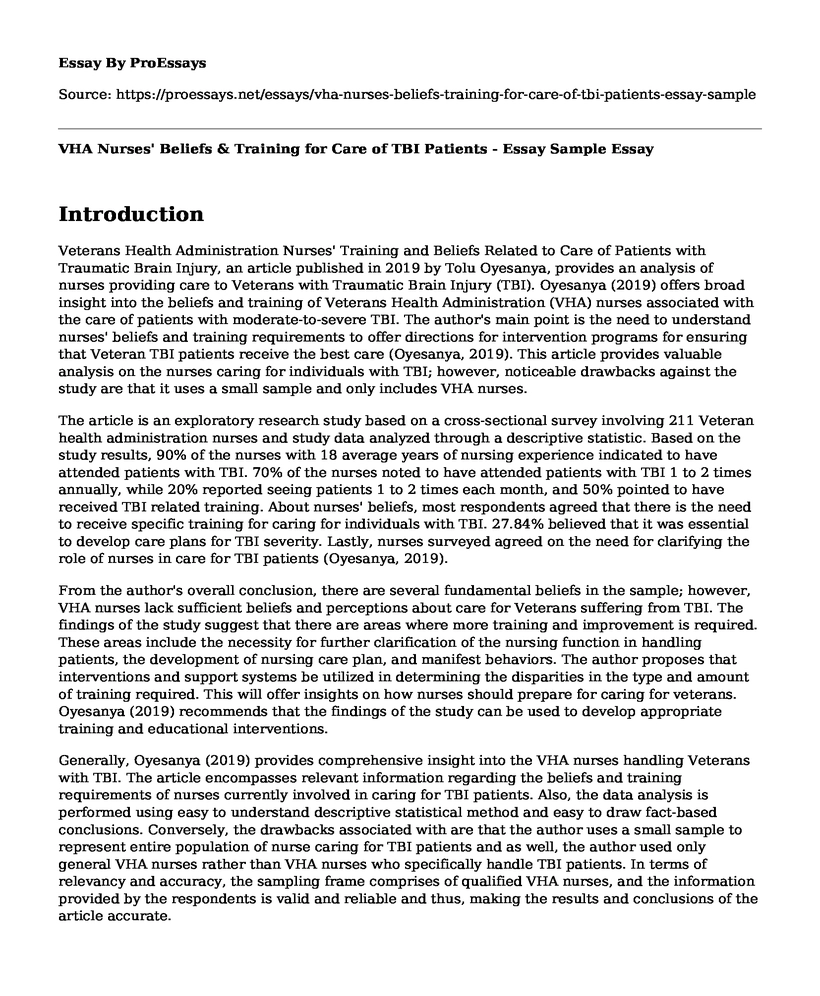Introduction
Veterans Health Administration Nurses' Training and Beliefs Related to Care of Patients with Traumatic Brain Injury, an article published in 2019 by Tolu Oyesanya, provides an analysis of nurses providing care to Veterans with Traumatic Brain Injury (TBI). Oyesanya (2019) offers broad insight into the beliefs and training of Veterans Health Administration (VHA) nurses associated with the care of patients with moderate-to-severe TBI. The author's main point is the need to understand nurses' beliefs and training requirements to offer directions for intervention programs for ensuring that Veteran TBI patients receive the best care (Oyesanya, 2019). This article provides valuable analysis on the nurses caring for individuals with TBI; however, noticeable drawbacks against the study are that it uses a small sample and only includes VHA nurses.
The article is an exploratory research study based on a cross-sectional survey involving 211 Veteran health administration nurses and study data analyzed through a descriptive statistic. Based on the study results, 90% of the nurses with 18 average years of nursing experience indicated to have attended patients with TBI. 70% of the nurses noted to have attended patients with TBI 1 to 2 times annually, while 20% reported seeing patients 1 to 2 times each month, and 50% pointed to have received TBI related training. About nurses' beliefs, most respondents agreed that there is the need to receive specific training for caring for individuals with TBI. 27.84% believed that it was essential to develop care plans for TBI severity. Lastly, nurses surveyed agreed on the need for clarifying the role of nurses in care for TBI patients (Oyesanya, 2019).
From the author's overall conclusion, there are several fundamental beliefs in the sample; however, VHA nurses lack sufficient beliefs and perceptions about care for Veterans suffering from TBI. The findings of the study suggest that there are areas where more training and improvement is required. These areas include the necessity for further clarification of the nursing function in handling patients, the development of nursing care plan, and manifest behaviors. The author proposes that interventions and support systems be utilized in determining the disparities in the type and amount of training required. This will offer insights on how nurses should prepare for caring for veterans. Oyesanya (2019) recommends that the findings of the study can be used to develop appropriate training and educational interventions.
Generally, Oyesanya (2019) provides comprehensive insight into the VHA nurses handling Veterans with TBI. The article encompasses relevant information regarding the beliefs and training requirements of nurses currently involved in caring for TBI patients. Also, the data analysis is performed using easy to understand descriptive statistical method and easy to draw fact-based conclusions. Conversely, the drawbacks associated with are that the author uses a small sample to represent entire population of nurse caring for TBI patients and as well, the author used only general VHA nurses rather than VHA nurses who specifically handle TBI patients. In terms of relevancy and accuracy, the sampling frame comprises of qualified VHA nurses, and the information provided by the respondents is valid and reliable and thus, making the results and conclusions of the article accurate.
Impact on Nursing Practice
Currently, there are limited literature and evidence-based guidelines related to the handling of people with TBI (Maas et al., 2013). Based on this notion, the subject article provides unique survey data and critical clinical information which can be used to base other evidence-based researches and to formulate new interventions in the nursing practice. The article offers a base for future research on TBI and handling Veterans diagnosed with TBI. According to the U.S. Department of Veteran Affairs (2019), VHA nurses struggle hard to make long-term differences in the lives of Veterans and their families. The information from the article can be used as a base to foster new nurses' beliefs and perceptions and manifest behaviors required for effective management of TBI patients.
Conclusion
In conclusion, TBI is a common injury among Veterans coming back from modern warfare. From the article, there is the necessity for understanding of the nursing function in handling TBI patients as the VHA nurses interviewed lack sufficient beliefs and perceptions about care for Veterans suffering from TBI. The article provides its audience with an imperative evaluation of nurses involved in caring for individuals with TBI. Although the article has several strengths, it uses a small sampling frame which comprises of general VHA nurses rather than specific VHA nurses regularly involved in treating TBI patients. This calls for future researches focusing on all nurses involved in caring for TBI patients.
References
Maas, A. I., Murray, G. D., Roozenbeek, B., Lingsma, H. F., Butcher, I., McHugh, G. S., ... & International Mission on Prognosis Analysis of Clinical Trials in Traumatic Brain Injury (IMPACT) Study Group. (2013). Advancing care for traumatic brain injury: findings from the IMPACT studies and perspectives on future research. The Lancet Neurology, 12(12), 1200-1210.
Oyesanya, T. O. (2019). Veterans Health Administration nurses' training and beliefs related to the care of patients with traumatic brain injury. PloS one, 14(9), e0222585.U.S. Department of Veteran Affairs. (2019). Nursing at VA. Retrieved from https://www.vacareers.va.gov/Careers/Nursing/
Cite this page
VHA Nurses' Beliefs & Training for Care of TBI Patients - Essay Sample. (2023, Feb 17). Retrieved from https://proessays.net/essays/vha-nurses-beliefs-training-for-care-of-tbi-patients-essay-sample
If you are the original author of this essay and no longer wish to have it published on the ProEssays website, please click below to request its removal:
- Essay on Education as a Prevention Strategy for Hyperosmolar Hyperglycemic State
- Essay Sample on Health Care Cost and Quality
- Institutional Critique Essay: Hospital Experience
- How Diseases Affect The Population Paper Example
- Paper Example on Marjorie's Diet Plan: A Financial Guide for Healthy Living
- Medical Marijuana Should Be Used in Medicine Essay
- Rising Diabetes: Treatment Needed to Prevent Complications & Death - Research Paper







